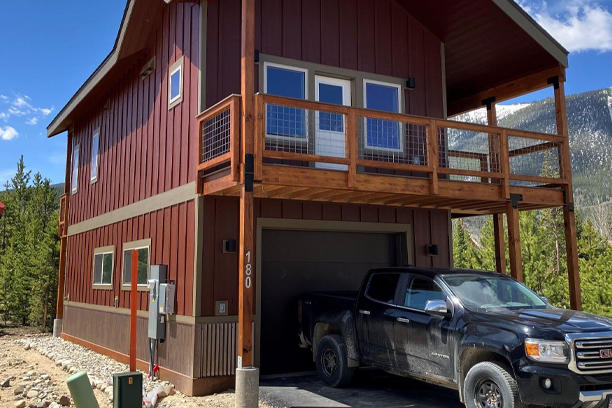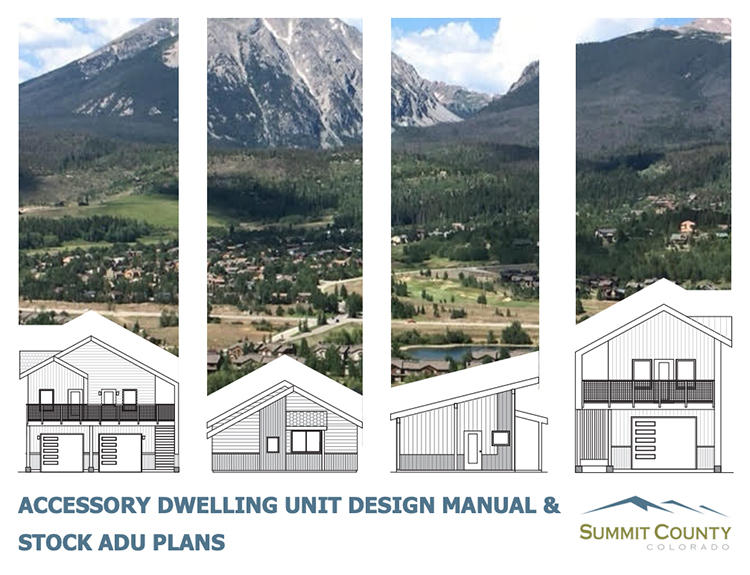Summit County
Background
 Summit County is a high-cost, mountain and resort community where impacts from second homeowners and tourism have made it increasingly difficult for local workers to find housing in their communities. To preserve housing for the local workforce, the County has required all ADUs to be deed-restricted since 1984. Despite this longstanding policy, interest in building ADUs among homeowners has been limited due to high upfront costs, zoning regulations, site constraints, and a short construction season.
Summit County is a high-cost, mountain and resort community where impacts from second homeowners and tourism have made it increasingly difficult for local workers to find housing in their communities. To preserve housing for the local workforce, the County has required all ADUs to be deed-restricted since 1984. Despite this longstanding policy, interest in building ADUs among homeowners has been limited due to high upfront costs, zoning regulations, site constraints, and a short construction season.
In response, the County has used several strategies to make ADUs more affordable and incentivize homeowners to build and legalize ADUs, including fee waivers, an ADU assistance program, and pre-approved ADU plans. These initiatives, along with recent code updates that allow detached ADUs and streamlined permitting, are a part of the County’s broader efforts to increase housing options for the local workforce.

Image source: Summit County
Program Design and Considerations
Incentivizing Affordable ADU Rentals
The County offers an ADU Fee Waiver Program, which reimburses all County-controlled development fees (including building, planning, engineering, and some environmental health fees) once a certificate of occupancy is issued and a 10-year payback clause (if the ADU is removed). A workforce deed restriction is recorded for the ADU.
Incentivising Affordable ADU Rentals and Supporting Homeowners to Bring Pre-existing ADUs into Compliance
Launched in 2023 and simplified in 2024, the newer ADU Assistance Program reimburses homeowners 25% of the total construction costs for building a new ADU or bringing a pre-existing, nonconforming ADU into compliance. This program includes funding for hard and soft costs, including water and sewer tap fees in districts that participate, and comes with a 30-year payback clause (if the ADU is removed), a workforce covenant and a rental cap at 110% of AMI.
Supporting Homeowners to Bring Pre-existing ADUs into Compliance
While not formally called an amnesty program, the County’s ADU Assistance Program can be used to legalize existing, nonconforming units. Many homeowners with noncompliant ADUs were hesitant to reach out to regulatory departments. In response, the Housing Department has taken on a proactive role in helping homeowners understand their options, navigate requirements, and bring their units into compliance voluntarily.
 Providing Pre-Approved ADU Plans
Providing Pre-Approved ADU Plans
In partnership with Design Path Studios, the County developed four free ADU stock plans, which include the shed, single-stack, double-stack and coop configurations. These plans aim to help reduce design costs and speed up the ADU review and approval process. The stock plans have been available since 2024, but uptake has been limited due to unique site constraints within the County, such as limited lot sizes due to larger primary units, and the need for more structural customization for the high-snowfall zone. Outreach is ongoing to increase visibility and interest in the plans, including showcasing built examples like Nellie’s Neighborhood — a compact, deed-restricted community of 14 smaller units above garages. The development utilizes the ADU stock plans and was designed to support mountain town living, with features like ample storage for kayaks, bikes, and other outdoor gear.
Requiring Only a Building Permit
Most ADUs in the County are reviewed through a building permit only, and do not require advanced approval from the Planning Department.
Takeaways
Summit County's comprehensive approach to promoting ADUs reflects its commitment to addressing a lack of housing options for its local workforce. Staff shared that tailoring programs to local concerns, like financing availability, community preferences, and physical constraints, is essential for long-term success. While challenges remain, these established programs and a continued effort to support and educate homeowners have laid the groundwork for increased ADU development.
Resources
- Summit County ADU webpage includes information on the ADU Assistance Program and ADU Stock Plans ADU Coop | Double Stack | Shed | Single Stack
- Quick Reference Guide & Checklist summaries rules and process
Accessory Dwelling Unit (ADU) Toolkit
We're Here to Help!
Do you have questions about the new laws and impacts to your jurisdiction? Check out our FAQ page, visit our main State Land Use and Housing Legislation page to learn about all the laws, or get one-on-one support below: